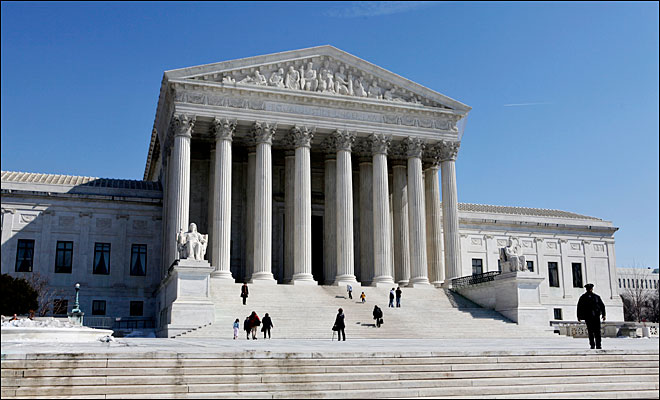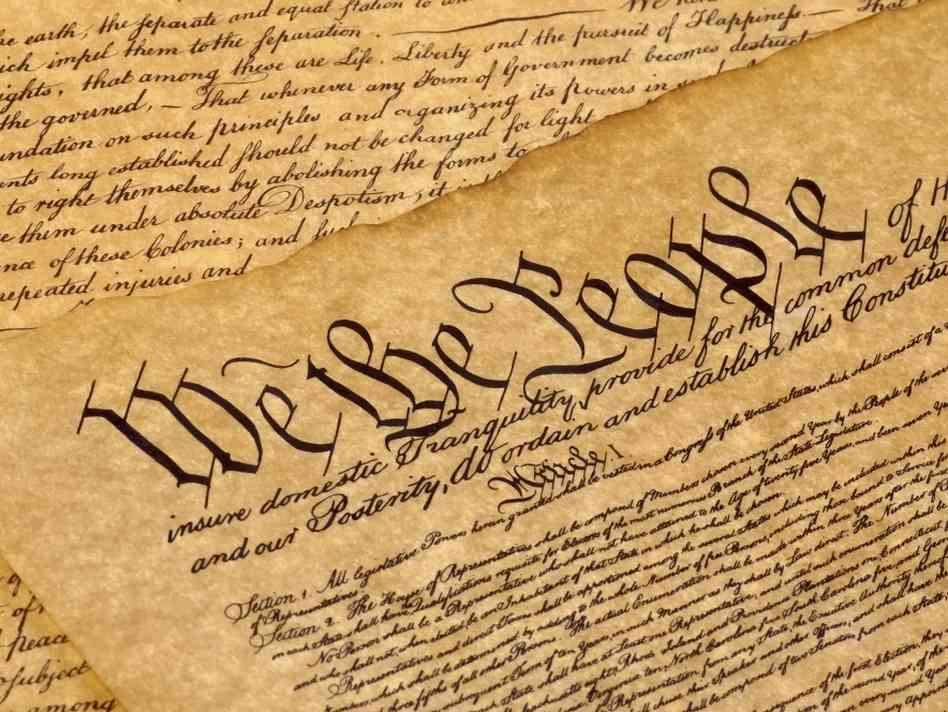It is bitter irony that the week in which President Obama talked about the “yawning gap between the magnitude of our challenges and the smallness of our politics” and addressed the nation about the hyperpartisan state of American politics, would end in a political argument over whether a sitting president has the right to nominate anyone for a Supreme Court vacancy.

No sooner had the news hit the wires that Supreme Court Justice Antonin Scalia had died, than Senate Majority Leader Mitch McConnell announced that the president needed to leave it up to the people and wait for the next election to fill the vacancy. Followed a few hours later by Senator Chuck Grassley, chairman of the Senate Judiciary committee, saying that no president had ever nominated a Supreme Court justice during an election year.
Wrong and wrong.
The people have already voted for who they want to nominate Supreme Court justices for vacancies occurring from January 2013 through January 2017 – it was called “The Election of 2012”. President Barack Obama won (you can google it). And there were dozens of times when a president nominated a justice who was confirmed in an election year, the latest one was in 1988 when Republican Ronald Reagan nominated Anthony Kennedy in 1987. He was later confirmed by a 97 to 0 vote in the Democratically controlled Senate in February of 1988, an election year and the last year of Reagan’s presidency.
The sitting president, Barack Obama in his statement yesterday evening:
I plan to fulfill my constitutional responsibilities to nominate a successor in due time. There will be plenty of time for me to do so, and for the Senate to fulfill its responsibility to give that person a fair hearing and a timely vote. These are responsibilities that I take seriously, as should everyone. They’re bigger than any one party. They are about our democracy. They’re about the institution to which Justice Scalia dedicated his professional life, and making sure it continues to function as the beacon of justice that our Founders envisioned.
President Obama has no intention of just letting the clock run out on his presidency … and he has no intention of letting the bitter party of NO nullify the election of 2012. He will respect the will of the American people who elected him with overwhelming numbers in 2008 and 2012 and fulfill his constitutional duties.
And Senator McConnell? You may have just handed our nominee the biggest election year gift ever. If you tell the nearly 66 million people who voted for President Obama that their votes do not matter, you can expect that they will have a reply for you: at the polls in November.
Elections matter. Let’s show the Republicans that We The People don’t appreciate their having two sets of rules: one for their presidents and one for ours.


When they say “It’s the Supreme Court”, they aren’t just kidding. If we spend the rest of the year with an 8 person court, the Republicans will have succeeded in shutting down two branches of government.
The only way We The People are allowed to express our opinion is by exercising our right to vote. Let’s redouble our efforts to win back the Senate – and make sure that a Democratic president is making the nominations for January 2017 through January 2021.
Lyle Denniston at SCOTUSblog on the possibility of a recess appointment (a temporary justice):
Whigs!! Yes, The Senate Arbitrarily Blocked A SCOTUS Nom Before–In The Mid-1800s
This is fitting because the Whigs are the closest correlation we have to the Teaparty Republicans, elevated to power by angry voters and swept away (we hope!) into the dustbin of history.
Some more historical perspective from Amy Howe at SCOTUSblog: Supreme Court vacancies in presidential election years
Senate Majority Leader Mitch McConnell on the will of the people:
~
The “winning” politics of obstruction:
Election implications …
U.S. Supreme Court vacancy upends presidential race
These are plenty of names being floated for the nomination. Of all of them, this one seems the most promising.
How does Sri Srinivasan feel about women?
I don’t know! Is the concern his Indian-American heritage? We should do some research on his rulings.
Here are a few things. He is 48 years old which makes him a pick for the future, not a placeholder.
From Wikipedia:
~
From Mother Jones back in 2013: Who Is Sri Srinivasan, Obama’s “Supreme Court Nominee in Waiting”?
~
WaPo, yesterday: Who will be Obama’s nominee to replace Scalia on the Supreme Court?
I am sure we will hear more. Ted Cruz voted for him in 2013 for the DC Circuit but then so did just about everyone else.
What happens to this year’s court session? Some analysis and commentary:
Professor Rick Hasen: Justice Scalia’s Death and Implications for the 2016 Election, the Supreme Court and the Nation
Ian Millhiser at ThinkProgress: The Simply Breathtaking Consequences Of Justice Scalia’s Death
Tom Goldstein at SCOTUSblog: What happens to this Term’s close cases? (Updated)
Thanks for all of this – spent a little time at SCOTUSblog but haven’t had a chance to really mull over any of this yet.
Will fight even harder to get a Democrat in the WH – because SCOTUS is going to shape so much of the future.
Tom Goldstein is a pretty good source of information. He is the owner of SCOTUSblog and pleads cases in front of the court all the time.
Here is his summary:
So we would win on Friedrichs, because the 9th Circuit ruling would affirm the union’s position. We would likely still prevail in the Texas abortion clinic case (to be heard in March). The Evenwel case would at least not be a loss probably delaying the one person one vote issue to another term (we prevailed in the lower courts). The contraceptive mandate would result in utter chaos because the case was taken up because of Circuit conflicts: there would be different laws for different parts of the country if they reverted to the Circuit Court decisions!
The murkiest would be the DAPA/DACA. Right now the only ruling is the stay issued at the district court level. SCOTUS was going to hear arguments about whether that stay should be lifted to allow the president his prosecutorial discretion. If that splits 4-4, the stay remains in place so the administration would have to convince Roberts or Kennedy to switch sides.
No one knows how Clarence Thomas will vote on anything now because he basically was “what he said”, following Scalia’s voting pattern. Maybe, with no trail of breadcrumbs for him to follow, he will recuse himself from all future decisions? :)
And, yes, we absolutely must win the presidency in November. The electability argument just got huge.
Commentary from WaPo: If Republicans block Obama’s Supreme Court nomination, he wins anyway
How far can that leverage go?
From your keyboard to the goddess’ ears, Linda Hirshman!
Charlie Pierce was peeking in my paste buffer!!
On the election, amen:
Captured from the Twitterings last night and this morning:
Some were saying that President Obama is a lame duck (he isn’t a lame duck until the election is called on November 8th) but this graphic accompanying one of those Tweets made me laugh out loud:

Fear the Duck!!!
Ten gets you twenty that the crappy media won’t call out the Rethugs on this business of not letting an elected president nominate a Supreme Court justice while black.
Let’s see, if he nominates Srinavasan and the Rethugs obstruct, they’re HANDING Asians a reason not to vote Rethug.
There will be a political price to pay if they refuse to let President Obama finish his 2nd term. Tom Goldstein at SCOTUSblog:
A conservative writer pointed out that the most reliable Democratic Party voting bloc is African-Americans and that keeping their turnout high is critical to our keeping the White House … and getting a chance to fill that seat if the Republicans shamelessly stonewall. Here are the numbers:
Start revving!!